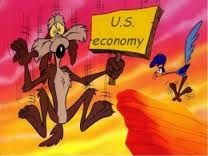Cross posted from The Stars Hollow Gazette
 With states and cities struggling to balance their budgets with lay offs of workers, cuts to benefits and wages, as well as, reduction of aid to schools, hospitals, clinics, and other agencies, states government desperate for revenue are looking to on-line gambling but may run up against the obstacle of the Justice Department:
With states and cities struggling to balance their budgets with lay offs of workers, cuts to benefits and wages, as well as, reduction of aid to schools, hospitals, clinics, and other agencies, states government desperate for revenue are looking to on-line gambling but may run up against the obstacle of the Justice Department:
It’s an idea gaining currency around the country: virtual gambling as part of the antidote to local budget woes. The District of Columbia is the first to legalize it, while Iowa is studying it, and bills are pending in places like California and Massachusetts.
But the states may run into trouble with the Justice Department, which has been cracking down on all forms of Internet gambling. And their efforts have given rise to critics who say legalized online gambling will promote addictive wagering and lead to personal debt troubles.
The states say they will put safeguards in place to deal with the potential social ills. And they say they need the money from online play, which will supplement the taxes they already receive from gambling at horse tracks, poker houses and brick-and-mortar casinos.
“States had looked at this haphazardly and not very energetically until the Great Recession hit, but now they’re desperate for money,” said I. Nelson Rose, a professor at Whittier Law School, where he specializes in gambling issues.
When it comes to taxing gambling, he said, “the thing they have left is the Internet.”
Meanwhile the Obama administration is mulling over whether to take a tougher approach to economic issues:
Mr. Obama’s senior adviser, David Plouffe, and his chief of staff, William M. Daley, want him to maintain a pragmatic strategy of appealing to independent voters by advocating ideas that can pass Congress, even if they may not have much economic impact. These include free trade agreements and improved patent protections for inventors.
But others, including Gene Sperling, Mr. Obama’s chief economic adviser, say public anger over the debt ceiling debate has weakened Republicans and created an opening for bigger ideas like tax incentives for businesses that hire more workers, according to Congressional Democrats who share that view. Democrats are also pushing the White House to help homeowners facing foreclosure.
Even if the ideas cannot pass Congress, they say, the president would gain a campaign issue by pushing for them.
“The president’s team puts a premium on being above the partisan fray, which is usually the right strategy,” said Senator Charles E. Schumer of New York, the No. 3 Democrat in the Senate. “But on this issue, when he knows what the right thing to do is, and when a rather small group on one side is blocking any progress, you have to be willing to call that group out if you want to get anything done.”
While Obama drags his feet staying with his bipartisan tick that has made matters worse, the housing market continues to sink under the weight of 4.6 million homes with delinquent mortgages and real estate owned sitting empty and the jobs market stagnates with the U3 at 9.1% mostly because 193,000 people dropped out of the labor force and weak jobs growth. There were only 117,000 jobs created in July not nearly enough to even keep up with population growth.
Calculated Risk has two great graphs that illustrate the two problems:
Click in images to enlarge
It well past time for Obama and the Democrats to stop whining about the obstructive Congress. So whatsoever the White House puts forth won’t get passed, at least make it a fight you can take to the street to say you at least tried to do something. Pragmatic won’t get it done, it hasn’t for the last three years.



 It’s been a rather tough week for capitalists. With people waking up from the illusion of money and riots erupting in otherwise reserved England, I almost feel a little sorry for the advocates of Milton Friedman. Almost.
It’s been a rather tough week for capitalists. With people waking up from the illusion of money and riots erupting in otherwise reserved England, I almost feel a little sorry for the advocates of Milton Friedman. Almost.